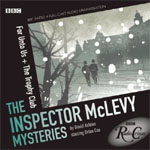
Speaking of Sir Walter Scott and Ivanhoe… I’ve been much into Sir Walter Scott’s Ivanhoe over the last six months. I’ve watched three different video adaptations. One was a theatrical version from the 1950s, one was a TV movie from the early 80s and one a TV miniseries from just a few years ago. I am currently re-reading the black and white comic book adaptation by Pocket Classics and I’ve also snagged the audiobook from LibriVox.
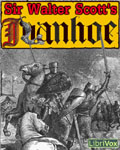 Ivanhoe
Ivanhoe
By Sir Walter Scott; Read by various
44 Zipped MP3 Files or Podcast – Approx. 19 Hours 25 Minutes [UNABRIDGED]
Publisher: LibriVox.org
Published: June 09, 2009
The fortunes of the son of a noble Saxon family in Norman England as he woos his lady, disobeys his father, and is loved by another. Set in late 12C England and in Palestine with Richard Cœur-de-Lion at the Crusades.
Podcast feed: http://librivox.org/bookfeeds/ivanhoe-by-sir-walter-scott.xml
iTunes 1-Click |SUBSCRIBE|
[Thanks also to Annise and Snemand]
Besides being a rollicking adventure, a heartfelt romance, a rough history lesson and a plea for peace between Christians and Jews, Ivanhoe is also a series of fun etymological English lessons. Consider, the first few sentences of the novel’s dialogue. Ivanhoe begins with a conversation between two Saxon slaves:
“The swine turned Normans to my comfort!” quoth Gurth; “expound that to me, Wamba, for my brain is too dull, and my mind too vexed, to read riddles.”
“Why, how call you those grunting brutes running about on their four legs?” demanded Wamba.
“Swine, fool, swine,” said the herd, “every fool knows that.”
“And swine is good Saxon,” said the Jester; “but how call you the sow when she is flayed, and drawn, and quartered, and hung up by the heels, like a traitor?”
“Pork,” answered the swine-herd.
“I am very glad every fool knows that too,” said Wamba, “and pork, I think, is good Norman-French; and so when the brute lives, and is in the charge of a Saxon slave, she goes by her Saxon name; but becomes a Norman, and is called pork, when she is carried to the Castle-hall to feast among the nobles; what dost thou think of this, friend Gurth, ha?”
Above Gurth (the fool) explains to Wamba (the swineherd) the logic behind calling meat that’s still on the hoof and meat that’s on the table by two different English words. “Swine” is the Saxon word for pig and “porc” [pork] is the Norman [French] word for pig. Soon after this scene these two Saxon slaves are confronted by troupe of Norman knights who proceed to turn one of Wamba’s Saxon swine into proper Norman pork.
The novel features plenty of back and forth. Indeed the more I think about it, the more I think classic Doctor Who took it’s pacing from Ivanhoe what with folks: being kidnapped, ransomed, dressing in disguise, falling in love with their enemies, forgiving each other, and fighting in chivalric combat. There are plenty of villains too. With an unforgiving father, a witch-smelling warrior-priest [those pesky Knights Templar], an ignoble Norman nobleman (who redeems himself in the end), a kvetching Jew and his fetching Jewess daughter. Yeah, I love this story!
Here’s a cross section of the different audiobook versions of this influential 19th century novel:
 Ivanhoe
Ivanhoe
By Sir Walter Scott; Read by David Warner
4 Cassettes – Approx. 6 Hours [ABRIDGED]
Publisher: Dove Audio (NewStar Media)
Published: 1997
ISBN: 9780787110635
 Ivanhoe
Ivanhoe
By Sir Walter Scott; Read by Jonathan Oliver
2 CDs – Approx. 2 Hours 39 Minutes [ABRIDGED]
Publisher: Naxos Audiobooks
Published: 1994
ISBN: 9626340258
 Ivanhoe
Ivanhoe
By Sir Walter Scott; Read by Frederick Davidson
14 Cassettes – Approx. 20.4 Hours [UNABRIDGED]
Publisher: Blackstone Audio
Published: 1998
ISBN: 9780786195718
Ivanhoe [Parts 1 and 2]
By Sir Walter Scott; Read by Jim Killavey
14 Cassettes – Approx. 21 Hours [UNABRIDGED]
Publisher: Books On Tape / Jimcin Editions
Published: 1986
ISBN: 9780786195718
 Ivanhoe
Ivanhoe
By Sir Walter Scott; Read by Michael Page
CDs or MP3-CD – Approx. Hours [UNABRIDGED]
Publisher: Brilliance Audio
Published: 2005
ISBN: 9781597370097 (cd), 1597370118 (mp3-cd)
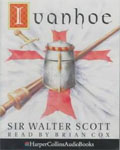 Ivanhoe
Ivanhoe
By Sir Walter Scott; Read by Brian Cox
2 Cassettes – Approx. 3 Hours 7 Minutes [ABRIDGED]
Publisher: HarperCollins Audio
Published: 1992, 1996
ISBN: 0001049283
Ivanhoe And The Lists Of Ashby
By Sir Walter Scott; Read by Doughlas Fairbanks Jr.
2 33 1/3 RPM LP Records – [ABRIDGED]
Publisher: Caedmon
Published: 1977
 Ivanhoe
Ivanhoe
By Sir Walter Scott; Read by Ronald Pickup
2 Cassettes – [ABRIDGED]
Publisher: HighBridge Audio
Published: 1997
ISBN: 1565112113
And here’s a peek at the Pocket Classics edition (ISBN: 0883017393):
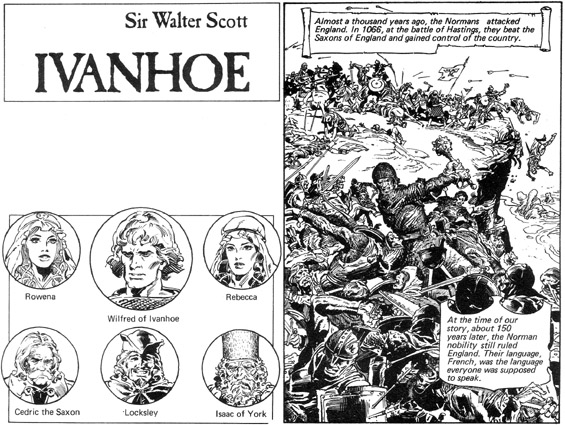
I wonder why there isn’t an audio drama version.
Posted by Jesse Willis





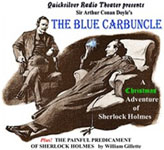 One caveat folks: This is an all-American production (Quicksilver is based out of New York). Don’t expect too much in the way of spot-on English accents.
One caveat folks: This is an all-American production (Quicksilver is based out of New York). Don’t expect too much in the way of spot-on English accents. 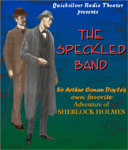 RDR had another Sherlock Holmes AD back in 2008, created by the same Quicksilver team: The Speckled Band Part 1 |
RDR had another Sherlock Holmes AD back in 2008, created by the same Quicksilver team: The Speckled Band Part 1 |



 Those Who Cannot Remember Doc Savage Are Condemned To Repeat Him: The 20th Century Backlash Against Posthuman Bodybuilders
Those Who Cannot Remember Doc Savage Are Condemned To Repeat Him: The 20th Century Backlash Against Posthuman Bodybuilders